- Home
- Jason Webster
Blood Med
Blood Med Read online
Contents
Cover
About the Book
About the Author
Also by Jason Webster
Dedication
Title Page
Epigraph
Note
Chapter One
Chapter Two
Chapter Three
Chapter Four
Chapter Five
Chapter Six
Chapter Seven
Chapter Eight
Chapter Nine
Chapter Ten
Chapter Eleven
Chapter Twelve
Chapter Thirteen
Chapter Fourteen
Chapter Fifteen
Chapter Sixteen
Chapter Seventeen
Chapter Eighteen
Chapter Nineteen
Chapter Twenty
Chapter Twenty-One
Chapter Twenty-Two
Chapter Twenty-Three
Chapter Twenty-Four
Chapter Twenty-Five
Chapter Twenty-Six
Chapter Twenty-Seven
Chapter Twenty-Eight
Chapter Twenty-Nine
Chapter Thirty
Chapter Thirty-One
Chapter Thirty-Two
Chapter Thirty-Three
Chapter Thirty-Four
Chapter Thirty-Five
Chapter Thirty-Six
Chapter Thirty-Seven
Chapter Thirty-Eight
Chapter Thirty-Nine
Chapter Forty
Chapter Forty-One
Chapter Forty-Two
Chapter Forty-Three
Acknowledgements
Copyright
ABOUT THE BOOK
Spain is corrupt and on the brink of collapse. The king is ill, banks are closing, hospitals are in chaos, homes are lost, demonstrators riot and rightwing thugs patrol the street. The tunnels beneath the streets are at once a refuge and a source of anger. And as the blood flows Cámara roars in on his motorbike ...
Cámara is back in Valencia, with his partner Alicia and his anarchist, marijuana-growing grandfather Hilario. In the old police headquarters, the mood is tense, as the chief hunts for cuts – who will go, Cámara or his friend Torres? The two men are flung into action investigating the suicide of an ex bank-clerk and the brutal murder of a young American woman. As the city erupts around them, their case takes them into the heart of the trouble.
This dazzling new Cámara novel – constantly surprising, full of vivid characters – exposes the dark underside of today’s Spain. A powerful, gripping page-turner, it confirms Max Cámara as the detective to watch, feeling the pulse of the moment.
ABOUT THE AUTHOR
Brought up in England, Jason Webster lived for many years in Spain. His acclaimed non-fiction books about Spain include Duende: A Journey in Search of Flamenco; Andalus: Unlocking the Secrets of Moorish Spain; Guerra: Living in the Shadows of the Spanish Civil War; Sacred Sierra: A Year on a Spanish Mountain and The Spy with 29 Names. The first Max Cámara crime novel Or the Bull Kills You, was longlisted for the CWA Specsavers Crime Thriller Awards New Blood Dagger 2011. This was followed by A Death in Valencia and The Anarchist Detective.
ALSO BY JASON WEBSTER
NON-FICTION
Duende: A Journey in Search of Flamenco
Andalus: Unlocking the Secrets of Moorish Spain
Guerra: Living in the Shadows of the Spanish Civil War
Sacred Sierra: A Year on a Spanish Mountain
The Spy with 29 Names: The Story of the Second World War’s Most Audacious Double Agent
THE MAX CÁMARA NOVELS
Or the Bull Kills You
A Death in Valencia
The Anarchist Detective
A Esther, Sebas y Rafa – amigos y policías.
Pero sobre todo amigos.
Blood Med
Jason Webster
As above, so below.
Hermes Trismegistus
NOTE
There are several police forces in Spain. Chief Inspector Max Cámara works for the Policía Nacional, which deals with major crimes in the larger towns and cities. The Guardia Civil is a rural police force, or gendarmerie, covering the countryside and smaller towns and villages. Both the Policía Nacional and Guardia Civil report to the Interior Ministry, although the Guardia Civil is paramilitary and has links with the Defence Ministry.
In addition to these national forces, towns and cities tend to have a local police force – the Policía Local, also known as the Policía Municipal. This deals with smaller crimes, official engagements and traffic duties, and is under the control of each respective Town Hall.
‘So that makes three last week alone.’
‘They’re on the up.’
‘Yeah, but did you hear about the last one?’
‘No. What happened?’
‘Shook them up a bit.’
‘Go on.’
‘So this guy – he’s in his early seventies. But he’s fit and well. I mean, he’s not ill or anything. But he’s divorced and his kids left home years ago, no grandchildren, so he’s on his own. And his pension’s been cut, what with everything going on. And the bank lost all his money. You know – the Caja Levante business.’
‘Yeah, I know someone who got stung by that.’
‘Caja Levante are going bust so they convince him – and everyone else – to turn his savings into shares in the bank, then overnight the shares lose all their value. So from having about a hundred grand to see him through retirement, suddenly he’s got nothing.’
‘Wife and kids gone . . .’
‘And he’s struggling to get by. So he starts thinking, What’s the point? Then with everything that happened at the weekend . . .’
‘What, the King?’
‘Yeah. Seems like it was a last straw for him. So he fasts for twenty-four hours . . .’
‘Why?’
‘Wanted everything to be clean inside. Thought it would make things easier. That’s what he wrote in the note.’
‘He explained it all?’
‘Yeah, wrote a long note with the whole story. They found it after.’
‘So what happened?’
‘So he sorts out his paperwork – will, household bills and all that. Even arranged for the electricity and phone people to come round and turn everything off. Then he puts on his best suit, takes a taxi to the hospital, gets out, walks to the front of A&E, makes sure one of the doctors has seen him, then stands to the side – you know, where the ambulances come in and out, on the drive there – pulls out a pistol and shoots himself in the head.’
‘Fuck.’
‘Drops dead on the spot. They tried to do what they could, but there was no chance. Then one of the nurses found the note on him, saying he didn’t want to go on, that he knew the hospitals were suffering with the crisis and that he was donating his body to medicine. Like an act of charity.’
‘Jesus. Can they? Use his body for medicine, then?’
‘Well, there wasn’t much left of his brain. But the rest of him was all right.’
‘Fuck.’
ONE
THE STORY WAS moving so slowly it made him want to reach for the remote and hit the fast-forward button. But the more trivial details the correspondents gave, the more general anxiety was produced and the more important the man lying in the hospital at the back of the shot was seen to be. This could go on for hours or even days. He should nip out and have a decent lunch; there would still be no developments by the time he got back.
Nonetheless, there was a curious fascination about it – a moment in history. They would all remember this, years later. He could imagine the future conversations now: Do you remember where you were when you heard?
The King was not
dead yet – not quite. But the message had been repeated endlessly by the media: he had had a massive heart attack and was undergoing emergency surgery. And while no one was saying it openly, few expected him to be leaving the hospital anything but ‘feet first’.
Cámara had been on the beach with Alicia when the news reached him, enjoying one of the premature summer days that early May sometimes brought, seducing people to expose their winter-white skin for a few hours before a cool wind scattered them home in search of warmer clothes.
No te quites el sayo hasta el cuarenta de mayo, Hilario, his grandfather, had reminded him, trotting out the traditional proverb. Don’t cast a clout ’til 40 May. But that was before they heard.
Now the temperature outside barely registered. The King’s sudden and life-threatening condition had cast a chill – and semi-paralysis – over the whole country.
Everyone in Homicidios was watching the television in the corner of the office as, in faraway Madrid, the authorities struggled with questions of what happened next. The Constitution was clear when it came to a simple death of the monarch. But what did they do if he was left lucid but incapacitated? The doctors might be able to keep him alive, but would he be able to function as head of state? Could the Crown Prince step in? The word ‘abdication’ had been often repeated in recent years as the King visibly aged, but the idea was viewed as a taboo subject for many: the Spanish monarchy was too fragile an institution to even contemplate such a thing.
Outside, the streets of Valencia were virtually silent, as they were throughout the country. The man who had overseen the building of their nation, who had guided them from dictatorship to democracy, hovered on the edge. And it could not have happened at a worse time. For how much longer could things hold together?
Standing near the back of the office, peering over his colleagues’ heads, Cámara watched the pack of journalists gathered at the expensive private clinic in the capital. Occasionally members of the Royal Family – at least those who hadn’t been tainted by scandal over the previous years – passed in and out, refusing to comment on developments inside. Through the window of an official car the Queen had been witnessed raising a lace handkerchief to her eye. Was she genuinely upset? No one could say.
The anxious tears among the thousands of Spaniards gathered nearby were more clearly heartfelt. The camera alternated between shots of dignitaries arriving at the hospital, and the worried faces of ordinary people in the street. He was a father figure for them, a central icon around which the country could – albeit tentatively and not without some stress – come together. But Catalonia was already edging towards independence; if the King died it would inevitably fuel the separatist movement there and in other parts of the country – as well as the determination of those bent on keeping Spain united.
Minds were already turning to plans for the funeral. It would be a big and complicated security operation. Police from Valencia and other parts of the country would almost certainly be bussed in to help make up the numbers. Foreign kings, queens, presidents and prime ministers would all attend. The King was a friendly and popular man – the best asset that ‘the Spain brand’ had, as one television commentator kept repeating. What the State-run media did not mention, however, was the Republican demonstration being held on the other side of Madrid. Cámara had seen references to it on the police intranet. Similar demonstrations were planned for Barcelona and parts of the Basque Country. No one had a clue how many might be showing up. There was talk of tens of thousands.
The door behind them clicked open and someone walked in. Cámara did not need to turn around. Chief Inspector Maldonado, head of the Valencia murder squad, had an unmistakable way of moving that announced his presence, strutting where others walked and pulling on doors as though they were obstacles to his relentless climb where others merely opened and closed them.
‘Morning,’ he called out, a little too loudly. No one answered, their eyes fixed on the screen.
Cámara could sense it in his blood before he even heard the words.
‘Torres and Cámara – I need you in my office now.’
They were back in the old police headquarters – the Jefatura building on Gran Vía de Fernando el Católico; everyone had seen it coming. The sci-fi fantasy building that had been their home for the past few years was impractical and too expensive to maintain. Valencian architect Jaume Montesa might have won international awards for his spectacular white-concrete designs, but the place had not even survived a decade before serious-looking cracks started appearing up the walls. And every time it rained for more than five minutes the cellars got flooded. Torrential downpours were a common problem in the area, but local-boy appeared to have forgotten that when drawing up his plans. Now, if anyone could find any money, they were going to turn it into an art museum, which was what it had been intended for in the first place – never a police station. No one missed it.
But being back at Fernando el Católico meant they were stuck in their cramped office again: two small adjoining rooms on the ground floor for the entire murder squad. Maldonado had decided it was not enough and had requisitioned another office on the floor above – which he kept for himself.
The three men exchanged no words as they took the lift up. Cámara glanced at their hazy reflection on the scratched steel surface of the doors. Maldonado’s jutting jaw and Torres’s thick black beard and rounded shoulders were just visible. And himself? He was taller than the other two and looked . . . well, he looked pretty good, he had to say. He was taking care of himself better than he could remember – living with Alicia made certain of that – and it showed.
Along the corridor, Torres edged past and walked into the office directly behind Maldonado. Someone else was there waiting for them.
Maldonado walked to his desk and began shuffling papers with his fingertips, as though moving pawns on a chessboard.
Cámara looked across to the fourth person in the room.
‘Oh yes,’ Maldonado said as nonchalantly as he could. ‘You know Chief Inspector Martín, don’t you?’
Torres grunted an acknowledgement. Cámara walked over and shook hands.
‘I think I’ve seen you around.’
‘I was on leave for a while,’ Cámara said. ‘Only been back a few weeks.’
‘Interesting time to return.’
‘Right, we need to get on,’ Maldonado interrupted them. ‘Cámara, in case you didn’t know, Laura Martín is head of the unidad de violencia de género.’
‘I am the sexual violence squad,’ she said. ‘It’s just me.’
She wore a grey skirt and beige blouse – almost a regulation uniform for a senior female officer – but he noticed multicoloured bracelets hanging loosely on her wrists and a couple of studs in one of her ears. She was two or three years younger than him, he thought, still in her early forties, with hazel green eyes that simultaneously smiled and held back, as though hiding and yet still reflecting some recent horror she had seen. If she had made head of the sexual violence squad – albeit with a team of one – she was ambitious if not necessarily capable; that would become clear later. Her clothes were conventional, but the cut of her red-brown hair and an ironic tone in her voice suggested something more complex.
‘OK, listen,’ said Maldonado. ‘I know it’s a difficult day for everyone, but as luck would have it our quiet run has come to an end. Right now. Four months without a murder in a city this big just isn’t natural. Anyway, I didn’t want to bother the others. Both cases look straightforward . . .’
‘We’ve got two?’ Torres said. ‘Four months and then two come in at once?’
‘One’s a clear murder case. The other’s a suicide attempt, but we need to check it out. And as you’ve so gallantly volunteered it’s yours.’
Torres rolled his eyes. No one liked a suicide: they left a nasty taste in the mouth. Especially the jumpers. All those mangled body parts. It never got easier, no matter how many you saw. And besides, there was nothing really to investigate.
It was all clearing up.
Maldonado passed him the file from his desk.
‘Hang on,’ Torres said. ‘Suicide attempt? What do you mean?’
‘Well, he’s not dead yet. Not quite.’
‘So why am I looking at it?’
‘Look, he’s in intensive care, in a coma. But by the time you get your arse in gear he’ll probably be dead anyway, right? So we’re getting ahead of the game. Just go and check it out. God knows all hell might be breaking loose soon what with the King and everything. Get going now before questions of national security start interfering with ordinary police work.’
Torres shuffled on the spot.
‘Why are we involved, then?’ he said.
‘What?’
‘I’m a murder detective. Isn’t it clear if it’s a suicide attempt?’
‘It’s in the file. The man’s called Diego Oliva. He was broke, about to have his flat repossessed. The usual story. I’m telling you, it’s almost certainly suicide . . .’
‘An attempt.’
‘Whatever. He jumped from a second-storey window – his own. You know what I’m saying. Just go and check it out.’
Torres slipped the file under his arm.
‘Well, go on then!’ Maldonado barked.
Torres and Cámara exchanged a conspiratorial glance and Torres left the room.
‘Right, next case,’ Maldonado said as the door closed.
‘Cámara, Chief Inspector Martín will be joining you on this.’
Maldonado thrust the file in his direction. Cámara nodded to Laura – they were roughly equals in the police hierarchy, and he was already thinking of her by her first name.
‘There’s a sexual element to it, then.’
‘Looks pretty simple, on the face of things,’ Maldonado said. ‘Young woman in her home in the Cánovas area. The husband called it in. He’s still there.’
He did not need to spell it out; the implication was understood.
‘The científicos from the forensic medicine department are already there. Go over, get a confession, whatever you have to do, and let’s see if we can wrap it up by the end of the day. With a bit of luck you might just do it.’
-->

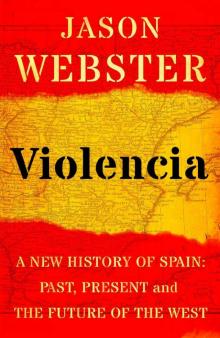 Violencia
Violencia Or the Bull Kills You
Or the Bull Kills You The Killing of El Niño Jesús
The Killing of El Niño Jesús The Spy with 29 Names
The Spy with 29 Names Duende
Duende Guerra
Guerra Sacred Sierra
Sacred Sierra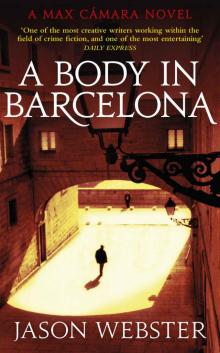 A Body in Barcelona: Max Cámara 5
A Body in Barcelona: Max Cámara 5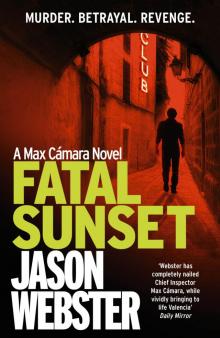 Fatal Sunset
Fatal Sunset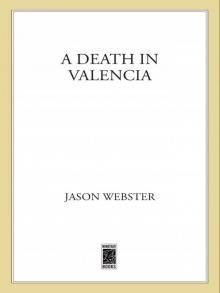 A Death in Valencia
A Death in Valencia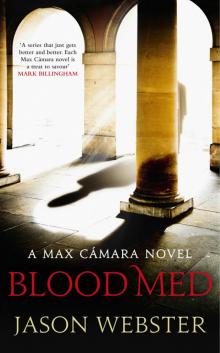 Blood Med
Blood Med Andalus
Andalus